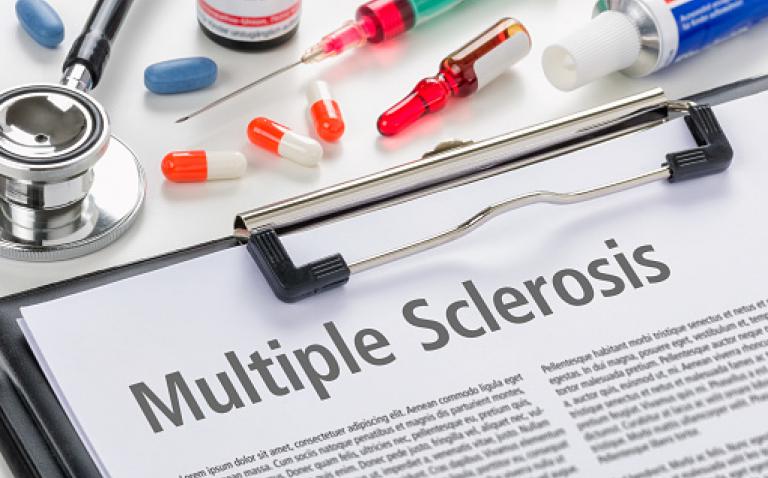Data presented, from both real-world and clinical settings, demonstrate that dimethyl fumarate delivers consistent and sustained efficacy among patients with relapsing-remitting multiple sclerosis (RRMS), and adds to its well-characterised safety profile for up to nine years of treatment.1-3
Retrospective results from the worldwide MSBase registry show that dimethyl fumarate reduced the risk of first relapse versus interferons by 26% (n=420 matched pairs; HR 0.74; 95% CI 0.57, 0.97; p=0.027), glatiramer acetate by 28% (n=382; 0.72; 0.54, 0.95; p=0.022) and teriflunomide by 34% (n=256; 0.66; 0.45, 0.99; p=0.042). In the primary analysis, no significant difference was found versus fingolimod-treated patients (n=415; 1.03; 0.73, 1.46; reference = FTY).1 Time to first relapse was measured using binomial propensity score matching.
“The MSBase registry is one of the largest sources of real-world data and includes nearly 40,000 MS patients across 72 countries. Our analysis shows that dimethyl fumarate significantly reduced the risk of first relapse compared to platform therapies and teriflunomide, and had comparable efficacy to fingolimod,” said H. Butzkueven, Associate Professor in the Department of Medicine, University of Melbourne and one of the investigators for the study.
As a secondary endpoint, the study also demonstrated similar and consistently lower annualised relapse rates (ARR) for dimethyl fumarate-treated patients versus those treated with interferons (0.23 [95% CI 0.19, 0.27] vs 0.26 [0.24, 0.29]), glatiramer acetate (0.24 [0.19, 0.28] vs 0.26 [0.23, 0.29]) and teriflunomide (0.17 [0.13, 0.22] vs 0.27 [0.22, 0.33]). ARR for dimethyl fumarate-treated patients was found to be similar but higher versus fingolimod-treated patients (0.22 [0.18, 0.27] vs 0.19 [0.17, 0.23]).1Positive ARR findings were also reported in a second real-world study analysing data from over 3500 dimethyl fumarate-treated patients from a US Commercial Claims Database. An average reduction in ARR of -0.11 (0.41 vs 0.30; p<0.05) was demonstrated in the year following initiation of dimethyl fumarate versus the year before initiation.
“These real-world findings demonstrate on a global scale the results observed during the dimethyl fumarate clinical trial program, and continue to support the use of dimethyl fumarate to improve outcomes for people living with relapsing-remitting MS” said Ralph Kern, SVP, Worldwide Medical, Biogen.
The MSBase registry data also found that approximately twice as many dimethyl fumarate-treated patients discontinued treatment after six months of continuous therapy relative to fingolimod (HR 2.39; 95% CI 1.78, 3.20) and interferons (HR 1.40; 95% CI 1.07, 1.83).1 No difference was found versus glatiramer acetate (HR 1.18; 95% CI 0.89, 1.56) or teriflunomide (HR 0.95; 95% CI 0.66, 1.37).1
The use of patient coaching to reduce discontinuation rates was demonstrated in a retrospective real-world study. In patients treated with dimethyl fumarate, rates were reduced in coached patients by up to 48% versus controls (5.7%, 17.1% and 29.2% of coached patients [n=4750] stopped therapy after 3, 12 and 24 months, versus 10.4%, 25.2% and 56.4% of controls [n=3266], respectively).5
New 7-year data from the ENDORSE study, an extension to the DEFINE and CONFIRM clinical trials, demonstrated that ARR remained low at 7 years for both treatment groups (0.13 [95% CI 0.10–0.18] with dimethyl fumarate; 0.16 [95% CI 0.11–0.24] for patients switched from placebo). Switch patients experienced a 61% relative reduction in ARR following the switch to dimethyl fumarate after 2 years on placebo (ARR 0.26 [95% CI 0.18–0.37] vs 0.10 [0.07–0.15]; p<0.0001).2 These findings illustrate the potential of dimethyl fumarate to provide positive clinical outcomes over the long-term for people with relapsing remitting MS.
References
- Spelman T, et al. Comparative analysis of MS outcomes in dimethyl fumarate-treated patients relative to propensity matched fingolimod, interferon, glatiramer acetate, or teriflunomide. P1157. The 32nd Congress of the European Committee for Treatment and Research in Multiple Sclerosis (ECTRIMS), London, England, 14–19 September 2016.
- Gold R, et al. Seven-year follow-up of the efficacy of delayed-release dimethyl fumarate in newly diagnosed patients with relapsing-remitting multiple sclerosis: integrated analysis of DEFINE, CONFIRM, and ENDORSE. P631. The 32nd Congress of the European Committee for Treatment and Research in Multiple Sclerosis (ECTRIMS), London, England, 14–19 September 2016.
- Fox RJ, et al. Absolute lymphocyte count and lymphocyte subset profiles during long-term treatment with delayed-release dimethyl fumarate in patients with relapsing-remitting multiple sclerosis. P716. The 32nd Congress of the European Committee for Treatment and Research in Multiple Sclerosis (ECTRIMS), London, England, 14–19 September 2016.
- Boster A, et al. Annual relapse rates in multiple sclerosis patients treated with different disease-modify therapies – findings from a real world setting. EP1481. The 32nd Congress of the European Committee for Treatment and Research in Multiple Sclerosis (ECTRIMS), London, England, 14–19 September 2016.
- Begus-Nahrmann Y, et al. The potential of individualized patient coaching to optimize treatment with delayed-release dimethyl fumarate: a retrospective analysis of patients with multiple sclerosis treated in a real-world setting. P1214. The 32nd Congress of the European Committee for Treatment and Research in Multiple Sclerosis (ECTRIMS), London, England, 14–19 September 2016.










